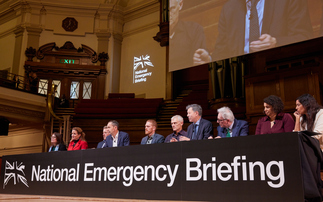Official analysis from UN confirms INDC pledges are insufficient to meet agreed threshold, but suggests target still in reach
Climate pledges from the majority of the world's countries are not enough to put the planet on a 2C pathway, according to official analysis released today by the United Nations, in the run-up to a major summit in Paris next month.
The detailed study concludes that under the current Intended Nationally Determined Contributions (INDCs) the planet will undergo a temperature rise of about 2.7C by the end of the century.
The INDCs, submitted by 146 countries around the world, cover 86 per cent of global greenhouse gas emissions.
The study confirms earlier analysis from third-party sources that suggested the current round of INDCs would not be enough to limit warming to 2C. However, collectively they represent a significant improvement on business-as-usual trajectories, which could have resulted in a global temperature rise of as much as 5C, the UN said.
UN officials stressed the 2C target - the threshold widely regarded as a "safe" level of warming - was still within reach. Christiana Figueres, the UN's top climate official, said the INDCs represent a "down-payment" on further climate action.
"Fully implemented these plans together begin to make a significant dent in the growth of greenhouse gas emissions: as a floor they provide a foundation upon which ever higher ambition can be built," she said in a statement.
"I am confident that these INDCs are not the final word in what countries are ready to do and achieve over time - the journey to a climate safe-future is underway and the Paris agreement to be inked in Paris can confirm, and catalyze that transition," she added.
Collectively, the current INDCs will bring down per capita emissions by eight per cent by 2025, and nine per cent by 2030 compared to 1990 levels, the UN said.
At the last round of preliminary negotiations ahead of the Paris summit countries formally adopted a 63-page draft text that includes a "ratchet mechanism" to encourage countries to submit more ambitious climate plans at regular intervals - probably every five years.
Jennifer Morgan, global director of the World Resources Institute's climate programme, said the report's findings underline the vital role of this so-called "ratchet mechanism" to incentivise further climate action.
"Countries must accelerate their efforts after the Paris summit in order to stave off climate change," she said in a statement. "The global climate agreement should include a clear mandate for countries to ramp up their commitments and set a long-term signal to phase out emissions as soon as possible."
Stephen Cornelius, WWF's chief adviser on climate change, agreed. "The Paris climate deal must include ways to encourage countries to take on tougher emissions targets. These targets must be fair and fit the scientific evidence in order to avoid the worst impacts of climate change," he said.
This article is part of BusinessGreen's Road to Paris hub, hosted in association with PwC










